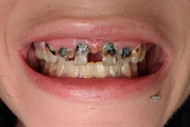8 Natural Ways to Avoid Cavities - us.instasmile.com
Dental cavities are a common problem, affecting people of all ages. However, there are many ways to avoid them – both through professional dental care and by making simple changes to your lifestyle. In this blog post, we will discuss eight natural ways to avoid cavities. Keep reading for more information.
1. Brushing should be done on a regular basis, but not excessively
Most people know that brushing their teeth twice a day is one of the best ways to get rid of plaque and germs and keep their teeth clean. Brushing, however, may only be effective if people use the proper technique.
When you brush, you should move your brush in small circles and brush the front, back, and top of each tooth. It takes between 2 and 3 minutes to complete this process. Back-and-forth sawing motions should be avoided.
You can hurt your gums and tooth enamel if you brush too hard or use a toothbrush with stiff bristles. Tooth sensitivity, permanent damage to the protective enamel on the teeth, and gum erosion are possible side effects.
2. Fluoride is beneficial
Fluoride is often added to public water supplies in order to help prevent tooth decay. However, some people have raised concerns about the safety of fluoride, claiming that it can lead to health problems such as bone cancer and thyroid problems.
While it is true that fluoride can be harmful if ingested in large quantities, the level of fluoride in public water supplies is carefully regulated and poses no significant risk to human health. In fact, the benefits of fluoride far outweigh any potential risks.
Studies have shown that fluoride helps to reduce tooth decay, and it is also effective in treating and preventing other dental problems such as gum disease. Moreover, fluoride has been shown to be safe for both children and adults when used as directed.
Given all of these benefits, it is clear that fluoride is a valuable tool in the fight against tooth decay.
3. Floss at least once a day
Plaque germs can get stuck between teeth, and a toothbrush can't eliminate them. It can also aid in the prevention of bad breath by removing debris and food stuck between the teeth.
Most dental health professionals say that you should gently push the floss down to the gum line and then move it up and down along the side of the tooth. It's important to avoid snapping the floss between the teeth, as this can cause pain and reduce the effectiveness of plaque removal.
4. Visit the dentist regularly
Experts recommend that people visit a dentist for a checkup every six months. A hygienist will clean your teeth and remove plaque and tartar during a routine dental examination.
The dentist will check for tooth decay, gum disease, mouth cancer, and other problems with oral health. They may also use dental X-rays to check for cavities on occasion.
People can ask their dentist how often they should have their teeth checked. The answer may vary depending on a person's health history, age, and overall dental health. However, anyone who notices changes in their mouth should see a dentist.
5. Quit smoking
The immune system is harmed by smoking, making it difficult for the body to heal tissues, including those in the mouth. It has identified smoking as a risk factor for gum disease. People who smoke may take longer to get better after getting dental work done.
Smoking also has an adverse effect on the mouth's appearance, causing yellowing of the teeth and tongue, as well as giving breath a foul odor.
6. Invest in a mouthwash
Studies have shown that some mouthwashes are good for the health of your teeth and gums. According to one study, mouthwash containing the antibacterial ingredient chlorhexidine helps control plaque and gingivitis.
People may want to talk to their dentist about which mouthwash will work best for them. Mouthwash isn't as good as brushing and flossing, but it can help when you do those things.
7. Avoid eating foods that are high in sugar and starch
Cavities are no fun. Not only are they painful, but they can also lead to more serious dental problems down the road. The good news is that cavities are preventable, and one of the best ways to avoid them is to limit your intake of sugary and starchy foods.
When bacteria in the mouth break down these types of foods, they produce acids that can damage tooth enamel. Over time, this damage can lead to cavities. So if you want to keep your teeth healthy and cavity-free, cut back on the candy and carbs.
8. Instead of sugary drinks, drink water
There's nothing quite like a cold, refreshing glass of water after a long day. Not only is it good for your health, but it can also help you avoid cavities. That's right - sugary drinks are one of the leading causes of cavities, and water is the best way to keep your teeth healthy and strong. When you drink water, it helps to rinse away food and plaque that can build up on your teeth. This can help to prevent cavities from forming, and it can also keep your breath fresh and clean. So next time you're reaching for a sugary drink, remember that water is the best way to avoid cavities.
Summary
Good dental hygiene can help a person's teeth, and gums stay healthy from childhood to adulthood. Brushing and flossing daily, quitting smoking, eating a healthy diet, and regularly seeing a dentist can help people avoid cavities, gum disease, and other dental problems. It could also be good for their health in general. Already struggling with cavities? At Instasmile we offer clip-on veneers allowing you to hide any cavaties you already have without the need for visiting a dentist.
Read also:

 UK
UK
 USA
USA
 Australia
Australia
